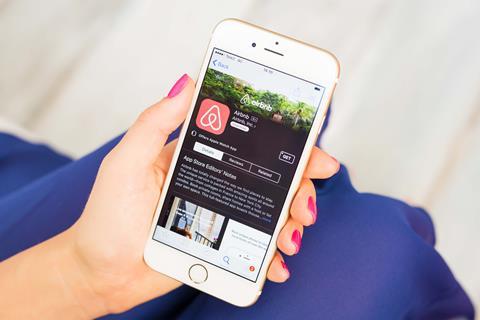From early next year, visitors to New York will have the chance to stay at one of the city’s most iconic locations, 75 Rockefeller Plaza.

Airbnb, the home-share giant, is taking over 10 floors of the building, creating 200 luxury suites comprising serviced apartments, a WeWork-style shared workspace, a private social club, a gym, a business centre, a restaurant, a bar – and an all-suite hotel in partnership with RXT Realty, which will operate the hotel with Airbnb generating bookings.
Airbnb is also partnering with NGD Homesharing in Miami and Austin to build two developments, both featuring concierge service, keyless entry and co-working spaces. And yes, they too will have hotel licences.
It means Airbnb is moving into the very space it sought to disrupt. But what will it mean for the UK property market?
Airbnb’s move into the hotel industry comes amid increased clampdowns across major cities on short-term rental restrictions. In New York, for example, it’s usually illegal for flats to be rented for 30 consecutive days or fewer, while in San Francisco hosts must obtain business registration and short-term rental certificates.
The UK is expected to follow the same path. London already limits short-term rentals to 90 days a year but is mulling over a registration system, while Edinburgh is calling for a licensing scheme.
So it is no surprise the rumours are that London is Airbnb’s next target for its hotel model.

Airbnb also believes the line between business and leisure travel is becoming blurred, and such accommodation will offer a different service from anything else on the market.
And it could be right: the modern, global economy means that increasing numbers of workers – especially millennial contractors – are more transient, working in one city before moving to the other side of the world for their next job. The likes of these ‘resi-hotels’ – offering serviced, longer-term stays with business-friendly add-ons such as shared workspaces and gyms – cater for exactly that market. And, crucially, with the new properties having hotel licences, unit owners will have freedom to rent them out as much as they want, getting around restrictions on stays.
For the hotel property sector, it could mean an impact on planned developments as Airbnb parks its tanks even more resolutely on the hospitality industry’s lawn. So what can the hospitality industry do to combat this threat?
Hotels need to recognise that people who are on the road for long stretches of time want elements to remind them of home comforts – the option to cook for themselves, chat with neighbours and experience the quirks of a home that hotels lack.
Just as Airbnb has invaded their space, so hotels should make forays into its territory. Indeed, some are doing exactly that: this summer, the world’s biggest chain, Marriott, launched its own home rental service called Homes and Villas with more than 2,500 homes available in 150 cities.
The hotel real estate sector has already suffered significantly because of the disruptive tactics of Airbnb. If it doesn’t move fast and learn from the home rental giant, the new breed of resi-hotels could prove a challenge too far.
Clive Docwra is managing director of McBains






























No comments yet